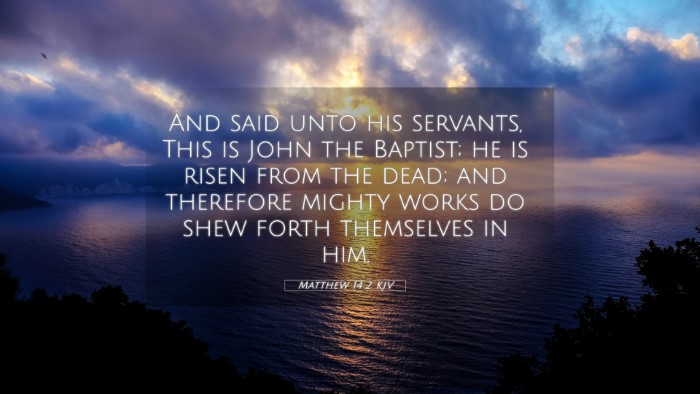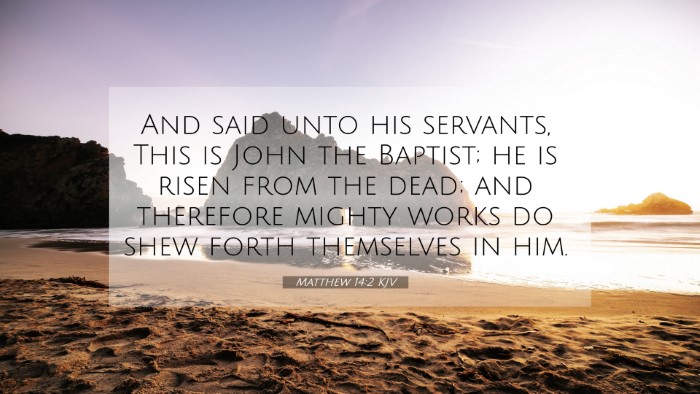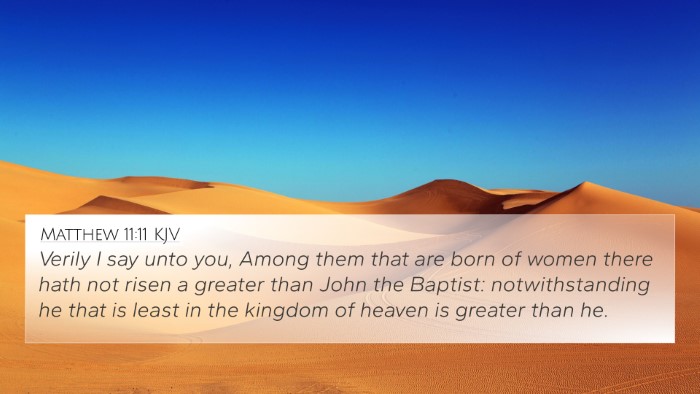Understanding Matthew 14:2
In Matthew 14:2, it states: "And said unto his servants, This is John the Baptist; he is risen from the dead; and therefore mighty works do show forth themselves in him." This verse carries significant implications regarding the identity of Jesus and the prophetic role of John the Baptist. Below is a summary of insights from public domain commentaries such as those by Matthew Henry, Albert Barnes, and Adam Clarke, organized to provide clarity on the meaning of this verse.
Verse Context
This verse occurs after the beheading of John the Baptist, establishing a connection between his martyrdom and the miraculous works of Jesus. The verse reflects King Herod's thoughts, expressing his fear that John had been resurrected, which emphasizes the power attributed to John even after death.
Commentary Insights
-
Matthew Henry's Commentary:
Henry emphasizes the confusion that surrounded Jesus’ identity at this time. Herod, troubled by his guilt over John’s death, attributed the miracles of Jesus to the resurrection of John. This shows the potent impression John left even in death, highlighting his role as a forerunner to Christ.
-
Albert Barnes' Notes:
Barnes notes the superstitious beliefs of the day, where individuals thought that a person's spirit could return to the body after death. He indicates that Herod's remarks reveal both his guilt and a deeper acknowledgment of John’s significance as a prophet sent from God.
-
Adam Clarke's Commentary:
Clarke provides an analysis of the cultural context, interpreting Herod's statement as rooted in the fear of divine retribution. The reference to John the Baptist serves to link the moral accountability Herod feels due to his prior actions against John, further establishing thematic biblical connections regarding the consequences of sin.
Key Themes
The key themes within Matthew 14:2 include:
- The Resurrection: Insights into the belief in resurrection and its implications.
- Prophetic Authority: The significance of John the Baptist’s ministry as carved within the narrative of Jesus' life.
- Moral Reflection: Herod's guilt and recognition of prophetic roles prompting a reflection on accountability.
Related Bible Cross References
Here are several biblical cross-references that relate to Matthew 14:2:
- Matthew 3:11: Discusses John baptizing in water and foretelling the coming of Jesus.
- Luke 7:16: Acknowledges Jesus as a great prophet, tying He and John’s ministries together.
- Mark 6:14-16: Similar accounts of Herod's confusion regarding Jesus' identity.
- John 1:29: John the Baptist declaring Jesus as the Lamb of God, illustrating his prophetic insight.
- Matthew 11:11: Jesus affirms John’s greatness among the prophets.
- Matthew 17:10-13: Discusses the return of Elijah, linking to John’s role as a forerunner.
- Acts 13:25: Refers to how John fulfilled his ministry and acknowledged Jesus’ coming.
Conclusion
In conclusion, Matthew 14:2 not only showcases the sentiments of King Herod but also aligns with broader themes of resurrection, prophetic ministry, and accountability. Understanding this verse through the lens of various commentaries deepens the insight into the connections between scripture, underscoring the relevance of cross-referencing biblical texts for a thorough study.
Cross-Referencing Bible Study Methods
For those interested in further exploring the connections between Bible verses, tools for Bible cross-referencing such as a Bible concordance or a cross-reference Bible study guide can be beneficial. The process of identifying connections between the Old and New Testaments facilitates a richer interpretation of scripture, enabling believers to comprehend intertwined themes throughout the biblical narrative.
SEO Keywords
The themes and interpretations presented here focus on several SEO keywords including:
- Bible verse cross-references
- Connections between Bible verses
- Comparative Bible verse analysis
- Inter-Biblical dialogue
Engaging with these keywords can assist readers in finding relevant content, study materials, and enrich their understanding of scripture in context.






